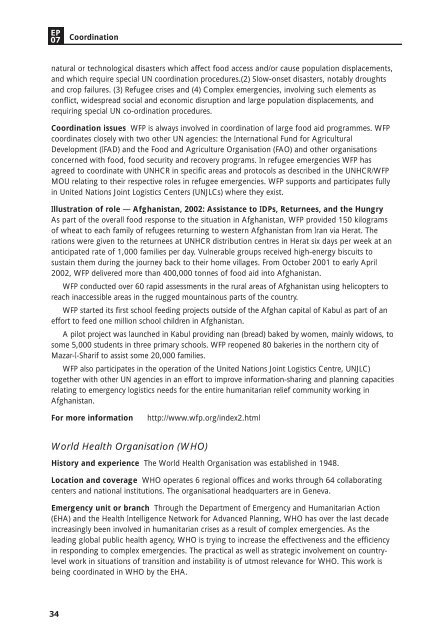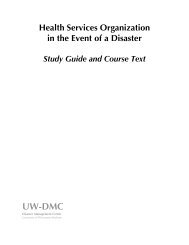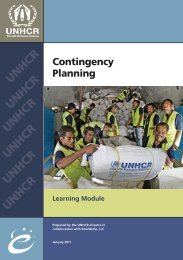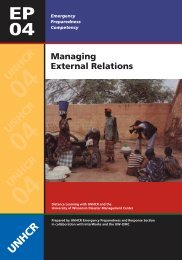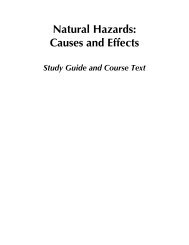Coordination - Disaster Management Center - University of ...
Coordination - Disaster Management Center - University of ...
Coordination - Disaster Management Center - University of ...
You also want an ePaper? Increase the reach of your titles
YUMPU automatically turns print PDFs into web optimized ePapers that Google loves.
EP07<strong>Coordination</strong>natural or technological disasters which affect food access and/or cause population displacements,and which require special UN coordination procedures.(2) Slow-onset disasters, notably droughtsand crop failures. (3) Refugee crises and (4) Complex emergencies, involving such elements asconflict, widespread social and economic disruption and large population displacements, andrequiring special UN co-ordination procedures.<strong>Coordination</strong> issues WFP is always involved in coordination <strong>of</strong> large food aid programmes. WFPcoordinates closely with two other UN agencies: the International Fund for AgriculturalDevelopment (IFAD) and the Food and Agriculture Organisation (FAO) and other organisationsconcerned with food, food security and recovery programs. In refugee emergencies WFP hasagreed to coordinate with UNHCR in specific areas and protocols as described in the UNHCR/WFPMOU relating to their respective roles in refugee emergencies. WFP supports and participates fullyin United Nations Joint Logistics <strong>Center</strong>s (UNJLCs) where they exist.Illustration <strong>of</strong> role — Afghanistan, 2002: Assistance to IDPs, Returnees, and the HungryAs part <strong>of</strong> the overall food response to the situation in Afghanistan, WFP provided 150 kilograms<strong>of</strong> wheat to each family <strong>of</strong> refugees returning to western Afghanistan from Iran via Herat. Therations were given to the returnees at UNHCR distribution centres in Herat six days per week at ananticipated rate <strong>of</strong> 1,000 families per day. Vulnerable groups received high-energy biscuits tosustain them during the journey back to their home villages. From October 2001 to early April2002, WFP delivered more than 400,000 tonnes <strong>of</strong> food aid into Afghanistan.WFP conducted over 60 rapid assessments in the rural areas <strong>of</strong> Afghanistan using helicopters toreach inaccessible areas in the rugged mountainous parts <strong>of</strong> the country.WFP started its first school feeding projects outside <strong>of</strong> the Afghan capital <strong>of</strong> Kabul as part <strong>of</strong> aneffort to feed one million school children in Afghanistan.A pilot project was launched in Kabul providing nan (bread) baked by women, mainly widows, tosome 5,000 students in three primary schools. WFP reopened 80 bakeries in the northern city <strong>of</strong>Mazar-I-Sharif to assist some 20,000 families.WFP also participates in the operation <strong>of</strong> the United Nations Joint Logistics Centre, UNJLC)together with other UN agencies in an effort to improve information-sharing and planning capacitiesrelating to emergency logistics needs for the entire humanitarian relief community working inAfghanistan.For more informationhttp://www.wfp.org/index2.htmlWorld Health Organisation (WHO)History and experience The World Health Organisation was established in 1948.Location and coverage WHO operates 6 regional <strong>of</strong>fices and works through 64 collaboratingcenters and national institutions. The organisational headquarters are in Geneva.Emergency unit or branch Through the Department <strong>of</strong> Emergency and Humanitarian Action(EHA) and the Health Intelligence Network for Advanced Planning, WHO has over the last decadeincreasingly been involved in humanitarian crises as a result <strong>of</strong> complex emergencies. As theleading global public health agency, WHO is trying to increase the effectiveness and the efficiencyin responding to complex emergencies. The practical as well as strategic involvement on countrylevelwork in situations <strong>of</strong> transition and instability is <strong>of</strong> utmost relevance for WHO. This work isbeing coordinated in WHO by the EHA.34


